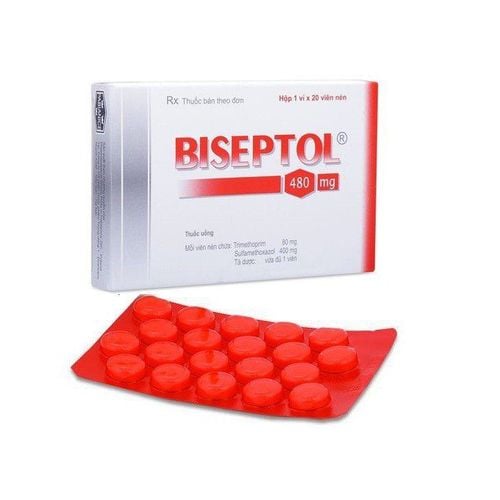This is an automatically translated article.
Cadiramide drug belongs to the group of gastrointestinal drugs, used to control acute and chronic diarrhea, loose stools. The active ingredient Loperamide in the drug is used to reduce mucosal irritation and reduce intestinal motility, helping to stop diarrhea.
1. What is Cadiramide?
Cadiramide is an anti-diarrheal drug, used to treat acute episodes of nonspecific diarrhea (of unknown cause), chronic diarrhea caused by enteritis or patients undergoing jejunostomy surgery. The drug is prepared in the form of hard capsules, with the packing specification of 10 blisters a box, each box includes 10 blisters.
Cadiramide medicine is made up of the main drug, Loperamide hydrochloride and other excipients, just enough for one hard capsule. Active ingredient Loperamide hydrochloride is commonly used to treat diseases of the gastrointestinal tract, helping to reduce irritation in the mucosa and cause muscle tone, contraction of the digestive tract.
2. What are the effects of Cadiramide?
Cadiramide medicine is made from Loperamide hydrochloride 2 mg. This active ingredient binds to the opiate receptor and causes reactions that help stop diarrhea, reduce stool volume as well as increase circulation and absorption time in the gastrointestinal tract. Specifically:
Loperamide helps reduce the release of acetylcholine. This is a characteristic neurotransmitter that causes contraction in smooth muscles and blood vessels. Reducing the release of acetylcholine helps to reduce irritation in the stomach lining - intestines, reducing stimulation to constrict the digestive tract. Loperamide hydrochloride causes a direct effect on the stomach - intestines due to direct absorption in this organ, reduces intestinal motility, prolongs digestion time, increases absorption of fluids and electrolytes in the digestive system. Loperamide binds to opioids causing tone of sphincters such as the anal sphincter and the ampulla of Vater; helps to reduce the incontinence reflex. Cadiramide is indicated for use in the following cases:
Helps relieve symptoms of acute diarrhea of unknown cause Helps relieve symptoms of chronic diarrhea in people with inflammatory bowel disease. Helps to reduce the amount of stool in the new bowel for patients having jejunostomy. Helps symptomatic treatment of acute diarrhea in adults and children over 12 years of age. Symptomatic treatment of acute episodes of diarrhea diagnosed in association with irritable bowel syndrome in adults over 18 years of age.
3. Usage of Cadiramid
3.1. How to use Cadiramide Cadiramide drug is very strongly absorbed and has a high affinity for the stomach, so patients take it orally. Take Cadiramide whole tablet, do not break, crush or remove the outer coating of the drug.
3.2. Dosage of Cadiramid Drug Usual Adult Diarrhea Dosage:
Starting dose: 4 mg Loperamide, equivalent to 2 Cadiramide tablets after the first loose stool. Maintenance dose: use 2 mg Loperamide, equivalent to 1 Cadiramide tablet after each loose stool. Do not exceed 16 mg of Loperamide within 24 hours. Usual treatment dose for children aged 8 to 12 years with acute diarrhea:
Initial dose: 2 mg Loperamide, divided into 3 or 2 oral doses based on age. Maintenance dose: 1 mg per 10 kg body weight after loose stools, the total dose used in a day should not be higher than the dose of the first day. Usual treatment dose for people with chronic diarrhea:
Adults: Use from 4 to 8 mg per day, can be taken once or divided into several oral doses. Children: The safety of Cadiramide has not been studied in this population. 3.3. When you forget to take Cadiramide, take it when you remember it. If it is almost time to remember the next dose, take the dose of Cadiramid as directed, do not take two doses at the same time to make up for the dose due to the risk of Loperamide overdose.
Overdose: Loperamide hydrochloride overdose reactions include serious symptoms such as respiratory depression, affecting the central nervous system. In addition, patients may experience abdominal cramps, constipation, increased opiates causing gastrointestinal irritation, nausea and vomiting. Loperamide overdose occurs when up to 60 mg of the active substance is used in a day. Monitor for signs of CNS depression, administer naloxone 2 mg intravenously and take the patient to the nearest surgical facility for care and treatment.
3.4. Contraindications to drugs Cadiramid Do not use Cadiramid drugs for children under 12 years old and the elderly. Do not use Cadiramide in patients avoid taking drugs that inhibit intestinal motility Do not use Cadiramide in people who are allergic or hypersensitive to lopiramide Use with caution in patients with severe hepatic impairment due to poor elimination function . Cadiramide should not be used in patients with acute ulcerative colitis or pseudomembranous colitis.
4. Notes when using Cadiramid
Side effects of Cadiramid
When using Cadiramid, patients may experience unwanted side effects such as:
Constipation, abdominal distension. Severe cases can cause intestinal obstruction. Allergic reactions due to hypersensitivity such as generalized red rash, urticaria occur only when the patient is particularly sensitive to the drug. Patients may experience pain, abdominal discomfort and feelings of nausea, dizziness,... Drug interactions Cadiramid
Combined use of Cadiramide with antibiotics such as cephalosporin, clindamycin, erythromycin or tetracycline may cause severe diarrhea, causing severe complications of diarrhea symptoms. Concomitant use of Cadiramide with analgesics increases the risk of severe constipation. May cause incompatibilities or synergistic reactions with stimulant foods and foods such as alcohol, beer, tobacco. Storing Cadiramid drugs
Store Cadiramid drugs in cool & dry places. Cadiramid drug storage temperature is below 30 degrees Celsius Do not let sunlight shine on the medicine. Keep Byralen out of the reach of children; Pets Cadiramide is an antidiarrheal and symptomatic treatment of acute and chronic diarrhea in children over 12 years of age and adults. Patients should follow the instructions for use listed in the drug packaging and the prescriptions from the doctor.
Follow Vinmec International General Hospital website to get more health, nutrition and beauty information to protect the health of yourself and your loved ones in your family.













